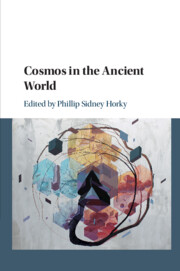Book contents
- Cosmos in the Ancient World
- Cosmos in the Ancient World
- Copyright page
- Dedication
- Epigraph
- Contents
- Contributors
- Acknowledgements
- An Historical Note on Kόσμος – Terminology
- Abbreviations
- Introduction
- Chapter 1 When Did Kosmos Become the Kosmos?
- Chapter 2 Ordering the Universe in Speech
- Chapter 3 Diakosmêsis
- Chapter 4 Aristotle on Kosmos and Kosmoi
- Chapter 5 Order and Orderliness
- Chapter 6 Polis as Kosmos in Plato’s Laws
- Chapter 7 Relating to the World, Encountering the Other
- Chapter 8 Tradition and Innovation in the Kosmos–Polis Analogy
- Chapter 9 Cosmic Choruses
- Chapter 10 All the World’s a Stage
- Chapter 11 The Architectural Representation of the Kosmos from Varro to Hadrian
- Chapter 12 “The Deep-Sticking Boundary Stone”
- Chapter 13 Cosmic Spiritualism among the Pythagoreans, Stoics, Jews and Early Christians
- Afterword
- Bibliography
- Index Locorum
- General Index
Introduction
Published online by Cambridge University Press: 18 June 2019
- Cosmos in the Ancient World
- Cosmos in the Ancient World
- Copyright page
- Dedication
- Epigraph
- Contents
- Contributors
- Acknowledgements
- An Historical Note on Kόσμος – Terminology
- Abbreviations
- Introduction
- Chapter 1 When Did Kosmos Become the Kosmos?
- Chapter 2 Ordering the Universe in Speech
- Chapter 3 Diakosmêsis
- Chapter 4 Aristotle on Kosmos and Kosmoi
- Chapter 5 Order and Orderliness
- Chapter 6 Polis as Kosmos in Plato’s Laws
- Chapter 7 Relating to the World, Encountering the Other
- Chapter 8 Tradition and Innovation in the Kosmos–Polis Analogy
- Chapter 9 Cosmic Choruses
- Chapter 10 All the World’s a Stage
- Chapter 11 The Architectural Representation of the Kosmos from Varro to Hadrian
- Chapter 12 “The Deep-Sticking Boundary Stone”
- Chapter 13 Cosmic Spiritualism among the Pythagoreans, Stoics, Jews and Early Christians
- Afterword
- Bibliography
- Index Locorum
- General Index
Summary
The 'Introduction' contextualizes the ancient notion of kosmos (which implies arrangement through forces of opposition, equilibrium or measure) with the twentieth-century notion of 'system' as understood by Van Bertalanffy and Lazlo and the nineteenth-century concept of 'cosmos' as configured by Alexander von Humboldt. It also traces the biref history of 'cosmos' from its first appearance in the English language, in the twelfth-century poetic commentary on the Bible, Ormulum. Finally, it summarizes the contributions that are to follow in the volume.
- Type
- Chapter
- Information
- Cosmos in the Ancient World , pp. 1 - 21Publisher: Cambridge University PressPrint publication year: 2019
- 1
- Cited by

